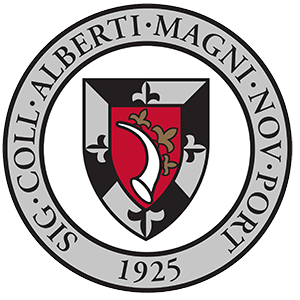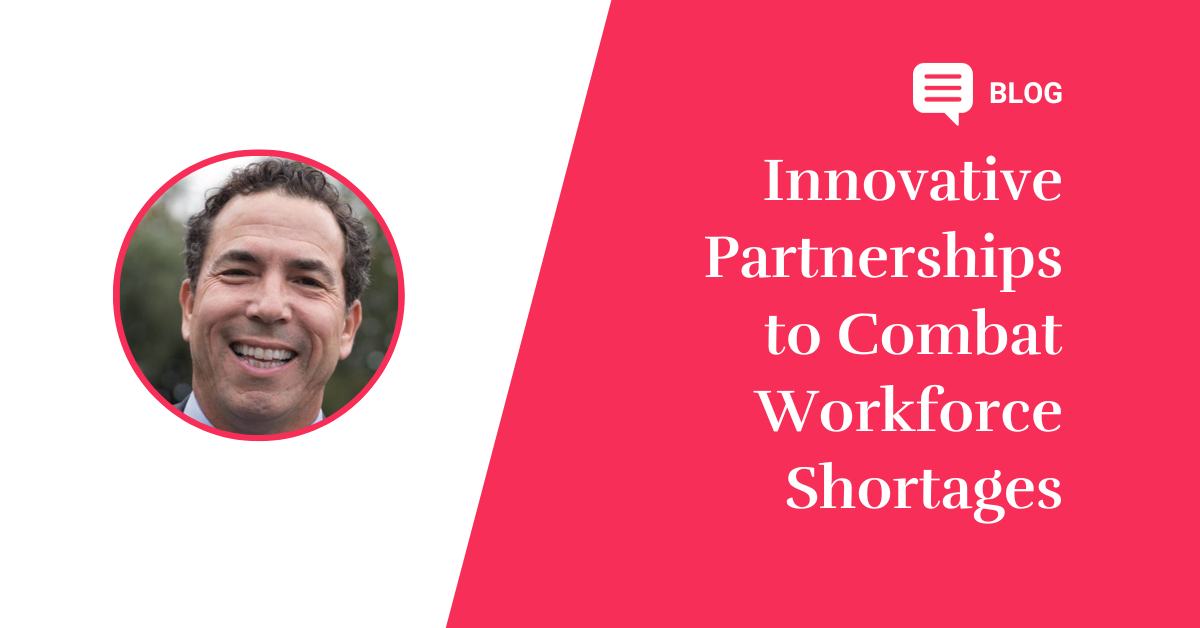Albertus Magnus College, Quinnipiac University Forge Agreement for Master’s in Social Work
By Dr. Marc M. Camille
President, Albertus Magnus College
New workforce challenges are always on the horizon. Our country and our economy have faced a slew of them over the centuries, from high unemployment to technology replacement and turnover. However, in this day and age of inflation and trying to put the pandemic in the rearview mirror, the so-called “tried and true” ways of solving these issues are no longer sufficient. They’re not fast enough. We have a worker shortage in critical, niche areas, and the employee pipeline just isn’t producing candidates fast enough.
![]() That’s where higher education plays a crucial role—to find unique and innovative ways to churn out top-notch talent in a timely manner. But this can’t be the role of a few individual institutions; rather, it must be the cooperative effort of multiple colleges and universities to put on our thinking caps, develop curricula that don’t unnecessarily reinvent the wheel, and create mutually beneficial partnerships that are a win-win-win for students, schools, and employers.
That’s where higher education plays a crucial role—to find unique and innovative ways to churn out top-notch talent in a timely manner. But this can’t be the role of a few individual institutions; rather, it must be the cooperative effort of multiple colleges and universities to put on our thinking caps, develop curricula that don’t unnecessarily reinvent the wheel, and create mutually beneficial partnerships that are a win-win-win for students, schools, and employers.
In this post, I’ll share an overview of the collaborative pathway created by Albertus Magnus College, a Catholic and Dominican, liberal arts-based college of about 1,300 students in New Haven, Connecticut, and Quinnipiac University, a private, secular institution of about 8,700 students located in neighboring Hamden. In September 2022, the two institutions announced an innovative partnership for qualified Albertus students to begin their master of social work (MSW) degree at Quinnipiac while finishing the final requirements for their undergraduate degree at Albertus.

This unique expedited pathway program reduces time and cost to completion for qualified Albertus students, expands and diversifies the pool of qualified candidates for Quinnipiac’s MSW program, and grows the pool of MSW graduates to help address the massive social worker shortage faced by Connecticut and the nation. To be eligible, students from Albertus must complete their bachelor’s degree with a minimum grade point average (GPA) of 3.0 and 20 semester credits in liberal arts courses, and in doing so, they are able to complete nine credits of prerequisite courses in Quinnipiac’s MSW program while enrolled in their undergraduate major at Albertus. The result is an expedited time of five and a half years to complete the combined degree, saving tuition money for Albertus students and fast-tracking [KW1] future social work employees with the latest, cutting-edge techniques and technology.
courses, and in doing so, they are able to complete nine credits of prerequisite courses in Quinnipiac’s MSW program while enrolled in their undergraduate major at Albertus. The result is an expedited time of five and a half years to complete the combined degree, saving tuition money for Albertus students and fast-tracking [KW1] future social work employees with the latest, cutting-edge techniques and technology.
The end result is simple and compelling. The process and journey toward finalizing the agreement is an interesting example of the power of creative thinking and focusing on what is possible rather than what at first seems impossible.
It All Started With a Conversation Over Lunch
![]() Personal connections are great conversation starters. During my tenure as president at Albertus, I’ve developed a good friendship with the Quinnipiac president, Dr. Judy Olian. On a number of occasions, we’ve discussed the potential of our two institutions collaborating to increase opportunities for our respective student bodies. We asked our respective chief academic officers to meet and begin the process of brainstorming.
Personal connections are great conversation starters. During my tenure as president at Albertus, I’ve developed a good friendship with the Quinnipiac president, Dr. Judy Olian. On a number of occasions, we’ve discussed the potential of our two institutions collaborating to increase opportunities for our respective student bodies. We asked our respective chief academic officers to meet and begin the process of brainstorming.
Over a shared lunch—food always inspires the mind!—Quinnipiac Provost Dr. Debra Liebowitz and Albertus Vice President for Academic Affairs Dr. Sean O’Connell focused their discussion on developing a program that spanned both institutions and benefited students. At the undergraduate level, Albertus has a strong sociology major with a concentration in social work. Many students who graduate from the program go on to earn an MSW. Quinnipiac offers an outstanding MSW program accredited by the Council on Social Work Education (CSWE). The two colleagues considered the possibility of an accelerated program that would allow high-achieving Albertus students to begin their graduate studies while completing their undergraduate degrees, reducing the time to earn the graduate degrees and—considering the profile of the Albertus student body—ideally reducing the cost as well.
That initial conversation launched an exploration into the possibilities, engaging each institution’s deans, directors, and faculty in social work, sociology, and health sciences. In the months that followed, they created a curriculum that outlined the vision…what remained was the process of implementation.
____
Creating New Pathways
![]() The Albertus-Quinnipiac partnership is mutually beneficial. Albertus is able to ensure that our qualified graduates can go on to earn an MSW degree at a neighboring institution, at a faster pace and at a more affordable price. In short, the collaboration expands educational opportunity and accessibility for Albertus students while providing Quinnipiac the chance to increase enrollments in its MSW program and in doing so, to enroll a more socioeconomically, ethnically, and racially diverse student body. In forging this partnership, the two institutions created a template for overcoming curricular and logistical challenges, one that can be used to create similar combined, expedited undergraduate and graduate program pathways. And we’re doing just that.
The Albertus-Quinnipiac partnership is mutually beneficial. Albertus is able to ensure that our qualified graduates can go on to earn an MSW degree at a neighboring institution, at a faster pace and at a more affordable price. In short, the collaboration expands educational opportunity and accessibility for Albertus students while providing Quinnipiac the chance to increase enrollments in its MSW program and in doing so, to enroll a more socioeconomically, ethnically, and racially diverse student body. In forging this partnership, the two institutions created a template for overcoming curricular and logistical challenges, one that can be used to create similar combined, expedited undergraduate and graduate program pathways. And we’re doing just that.
____
The Acadeum Advantage
![]() A key factor in making this partnership possible is that both Albertus and Quinnipiac are members of the Council of Independent Colleges (CIC) Online Course Sharing Consortium. This provides CIC member institutions access to expanded curricular offerings through Acadeum’s course sharing platform. The Acadeum platform facilitates an Albertus student’s ability to take graduate courses in Quinnipiac’s CSWE-accredited program. At the same time, because the courses are taken through the consortium, they can be applied as Albertus courses for undergraduate credit. The consortial arrangement and the use of the platform provide the necessary vehicle for students to take courses that simultaneously meet specific degree and accreditation requirements at the two distinct institutions. Acadeum provided the immediate opportunity to systematically manage the registrations, enrollment data, grades, course details, and syllabi, as well as the financial exchange, so we didn’t need to create manual procedures or add workload to facilitate this collaboration allowing us to get right to serving our students.
A key factor in making this partnership possible is that both Albertus and Quinnipiac are members of the Council of Independent Colleges (CIC) Online Course Sharing Consortium. This provides CIC member institutions access to expanded curricular offerings through Acadeum’s course sharing platform. The Acadeum platform facilitates an Albertus student’s ability to take graduate courses in Quinnipiac’s CSWE-accredited program. At the same time, because the courses are taken through the consortium, they can be applied as Albertus courses for undergraduate credit. The consortial arrangement and the use of the platform provide the necessary vehicle for students to take courses that simultaneously meet specific degree and accreditation requirements at the two distinct institutions. Acadeum provided the immediate opportunity to systematically manage the registrations, enrollment data, grades, course details, and syllabi, as well as the financial exchange, so we didn’t need to create manual procedures or add workload to facilitate this collaboration allowing us to get right to serving our students.
____
Anticipated Impact
![]() We anticipate that the new partnership will provide faster and more economical access and opportunity to a higher degree and a job in a field that annually has almost 75,000 openings. According to the US Bureau of Labor Statistics, it is projected that the United States will face a massive social worker shortage by 2030. Already, there are serious regional shortages in rural areas, and the shortfall will equal tens of thousands of professionals nationwide in just a few years.
We anticipate that the new partnership will provide faster and more economical access and opportunity to a higher degree and a job in a field that annually has almost 75,000 openings. According to the US Bureau of Labor Statistics, it is projected that the United States will face a massive social worker shortage by 2030. Already, there are serious regional shortages in rural areas, and the shortfall will equal tens of thousands of professionals nationwide in just a few years.
I believe innovative, expanded, and expedited degree program pathway agreements, such as the one signed by Albertus and Quinnipiac, offer great promise to better serve the equally important needs of students and workforce development. Using a “what’s possible” mindset starting with presidential leadership and carrying through to academic administrators and faculty, Albertus and Quinnipiac are proud to launch the MSW partnership. We’re already in dialogue on other program pathways that might be possible, including opportunities for Quinnipiac students to pursue graduate programs at Albertus as well as for Albertus students to pursue graduate programs at Quinnipiac.
Additional Resources:



